形容词比较级常用词总结(精品)
英语形容词的比较级和最高级整理

英语形容词的比较级和最高级整理常规:1、一般直接在词尾加er;est.tall---taller---the tallestgreat---greater---the greatest2、以字母e结尾的直接加r;stnice---nicer---the nicestfine---finer---the finest3、以辅音字母加y结尾的形容词变y为i再加er;estbusy---busier---the busiestheavy---heavier---the heaviest4、重读闭音节结尾的单音节词,若词尾只有一个辅音字母时,须双写这个辅音字母再加er;estbig-bigger-the biggesthot -hotter-the hottest5、少数以-y,-er,-ow,-ble结尾的双音节词,末尾加-er^D-est(以-y 结尾的词,如-y前是辅音字母,则变y为i,再加-er和-est;以-e 结尾的词仍只加-r和-st)happy—happier—happiestclever—cleverer—cleverest5、多音节和部分双音节词在词前加more、mosteasily--more easily--most easilybeautiful--more beautiful--the most beautiful特殊:(1 )有些单音节词的比较等级常用more和most,如glad,fond,shy,sly(但like 只可用more 和most)。
Eg:I am not more glad than you.我可没像你那样高兴。
Uncle Jack was more like a book of reference to my father.杰克大叔对我父亲来说真是一部参考书。
(2)有些单音节词用-er和-est或more和most皆可,如free,clear 等。
Eg:I'm clearer/more clear about it than before.对这事,我比以前更清楚了。
形容词比较级常用词总结
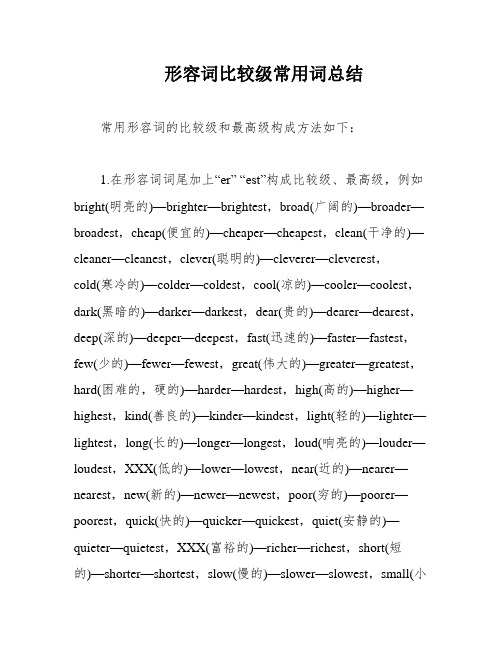
形容词比较级常用词总结常用形容词的比较级和最高级构成方法如下:1.在形容词词尾加上“er” “est”构成比较级、最高级,例如bright(明亮的)—brighter—brightest,broad(广阔的)—broader—broadest,cheap(便宜的)—cheaper—cheapest,clean(干净的)—cleaner—cleanest,clever(聪明的)—cleverer—cleverest,cold(寒冷的)—colder—coldest,cool(凉的)—cooler—coolest,dark(黑暗的)—darker—darkest,dear(贵的)—dearer—dearest,deep(深的)—deeper—deepest,fast(迅速的)—faster—fastest,few(少的)—fewer—fewest,great(伟大的)—greater—greatest,hard(困难的,硬的)—harder—hardest,high(高的)—higher—highest,kind(善良的)—kinder—kindest,light(轻的)—lighter—lightest,long(长的)—longer—longest,loud(响亮的)—louder—loudest,XXX(低的)—lower—lowest,near(近的)—nearer—nearest,new(新的)—newer—newest,poor(穷的)—poorer—poorest,quick(快的)—quicker—quickest,quiet(安静的)—quieter—quietest,XXX(富裕的)—richer—richest,short(短的)—shorter—shortest,slow(慢的)—slower—slowest,small(小的)—smaller—smallest,smart(聪明的)—smarter—smartest,soft(柔软的)—softer—softest,strong(强壮的)—stronger—strongest,sweet(甜的)—sweeter—sweetest,tall(高的)-taller-tallest。
期末英语必考!形容词的比较级和最高级知识点汇总

期末英语必考!形容词的比较级和最高级知识点汇总变化规则大多数形容词和副词有比较级和最高级的变化,即原级、比较级和最高级,用来表示事物的等级差别。
原级即形容词的原形,比较级和最高级有规则变化和不规则变化两种。
(1)单音节词加词尾-er,-est来构成比较级和最高级。
tall(高的) taller tallestgreat(巨大的) greater greatest(2)以不发音的e结尾的单音节词只加-r,-stnice(好的) nicer nicestlarge(大的) larger largestable(有能力的) abler ablest(3)以一个辅音字母结尾的闭音节单音节词,双写结尾的辅音字母,再加-er,-estbig(大的) bigger biggesthot热的) hotter hottestred红色的 redder reddest(4)'以辅音字母+y'结尾的双音节词,改y为i,再加-er,-esteasy(容易的) easier easiestbusy(忙的) busier busiest(5)以ly结尾的副词,除early-earlier-earliest,其他都是加more most.Slowly-more slowly-most slowlyBravely-more bravely-most bravelyquickly-more quickly-most quickly(6)少数以-er,-ow结尾的双音节词未尾加-er,-estclever(聪明的) cleverer cleverestnarrow(窄的) narrower narrowest(7)其他双音节词和多音节词在前面加more,most来构成比较级和最高级。
如:important(重要的) more important most importanteasily(容易地) more easily most easily(8)一些词的比较级和最高级,可以加-er或 -est,也可以加more 或most如:clever, polite等。
形容词的比较级和最高级大全
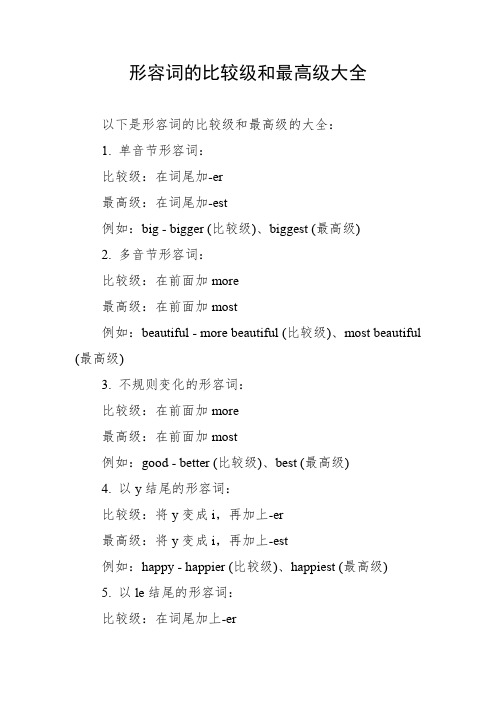
形容词的比较级和最高级大全以下是形容词的比较级和最高级的大全:1. 单音节形容词:比较级:在词尾加-er最高级:在词尾加-est例如:big - bigger (比较级)、biggest (最高级)2. 多音节形容词:比较级:在前面加more最高级:在前面加most例如:beautiful - more beautiful (比较级)、most beautiful (最高级)3. 不规则变化的形容词:比较级:在前面加more最高级:在前面加most例如:good - better (比较级)、best (最高级)4. 以y结尾的形容词:比较级:将y变成i,再加上-er最高级:将y变成i,再加上-est例如:happy - happier (比较级)、happiest (最高级)5. 以le结尾的形容词:比较级:在词尾加上-er最高级:在词尾加上-est例如:possible - more possible (比较级)、most possible (最高级)6. 少数不规则变化的形容词:比较级:在前面加more最高级:在前面加most例如:famous - more famous (比较级)、most famous (最高级)7. 特殊的比较级和最高级:例如:well - better (比较级)、best (最高级)8. 副词的比较级和最高级:比较级:在后面加-er最高级:在后面加-est例如:slowly - more slowly (比较级)、most slowly (最高级)以上是常见的形容词的比较级和最高级,但是也有一些不规则变化的形容词需要记忆。
同时,需要注意的是,有些形容词没有比较级和最高级,如unique。
形容词的比较级大全
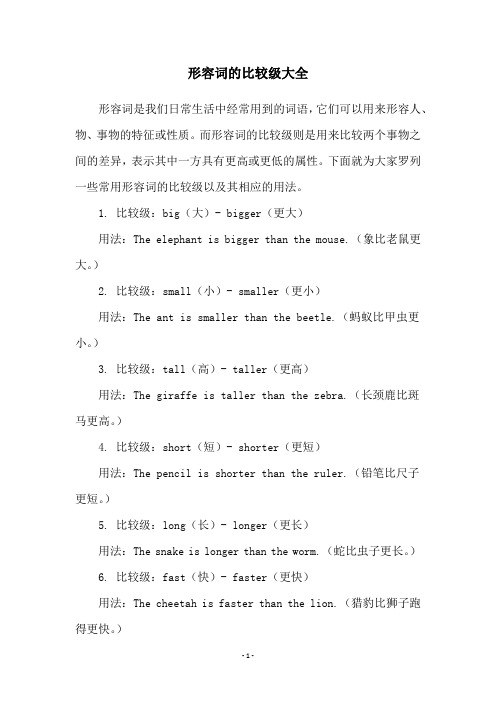
形容词的比较级大全形容词是我们日常生活中经常用到的词语,它们可以用来形容人、物、事物的特征或性质。
而形容词的比较级则是用来比较两个事物之间的差异,表示其中一方具有更高或更低的属性。
下面就为大家罗列一些常用形容词的比较级以及其相应的用法。
1. 比较级:big(大)- bigger(更大)用法:The elephant is bigger than the mouse.(象比老鼠更大。
)2. 比较级:small(小)- smaller(更小)用法:The ant is smaller than the beetle.(蚂蚁比甲虫更小。
)3. 比较级:tall(高)- taller(更高)用法:The giraffe is taller than the zebra.(长颈鹿比斑马更高。
)4. 比较级:short(短)- shorter(更短)用法:The pencil is shorter than the ruler.(铅笔比尺子更短。
)5. 比较级:long(长)- longer(更长)用法:The snake is longer than the worm.(蛇比虫子更长。
) 6. 比较级:fast(快)- faster(更快)用法:The cheetah is faster than the lion.(猎豹比狮子跑得更快。
)7. 比较级:slow(慢)- slower(更慢)用法:The turtle is slower than the rabbit.(乌龟比兔子跑得更慢。
)8. 比较级:easy(容易)- easier(更容易)用法:The multiple-choice test is easier than the essay test.(选择题比论述题更容易。
)9. 比较级:difficult(困难)- more difficult(更困难)用法:Calculus is more difficult than algebra.(微积分比代数更困难。
形容词比较级常用词总结 - 形容词比较级常用词总结的特点
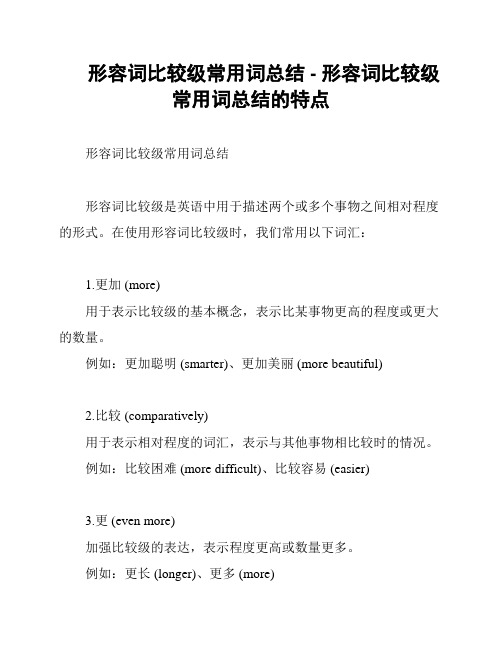
形容词比较级常用词总结 - 形容词比较级
常用词总结的特点
形容词比较级常用词总结
形容词比较级是英语中用于描述两个或多个事物之间相对程度的形式。
在使用形容词比较级时,我们常用以下词汇:
1.更加 (more)
用于表示比较级的基本概念,表示比某事物更高的程度或更大的数量。
例如:更加聪明 (smarter)、更加美丽 (more beautiful)
2.比较 (comparatively)
用于表示相对程度的词汇,表示与其他事物相比较时的情况。
例如:比较困难 (more difficult)、比较容易 (easier)
3.更 (even more)
加强比较级的表达,表示程度更高或数量更多。
例如:更长 (longer)、更多 (more)
4.较 (rather)
用于弱化比较级的表达,表示程度稍低或数量较少。
例如:较好 (better)、较少 (fewer)
5.更多 (more)
表示数量或程度更大。
例如:更多人 (more people)、更多知识 (more knowledge)
6.更少 (less)
表示数量或程度更小。
例如:更少时间 (less time)、更少金钱 (less money)
请注意,这仅是一些常用的形容词比较级词汇总结,实际使用时还应根据具体语境选择合适的词汇。
记住,形容词比较级是相对的,需要根据所比较的事物来决定使用哪种词汇。
希望这份简要总结对你有帮助!。
掌握中的常见比较级和最高级形容词
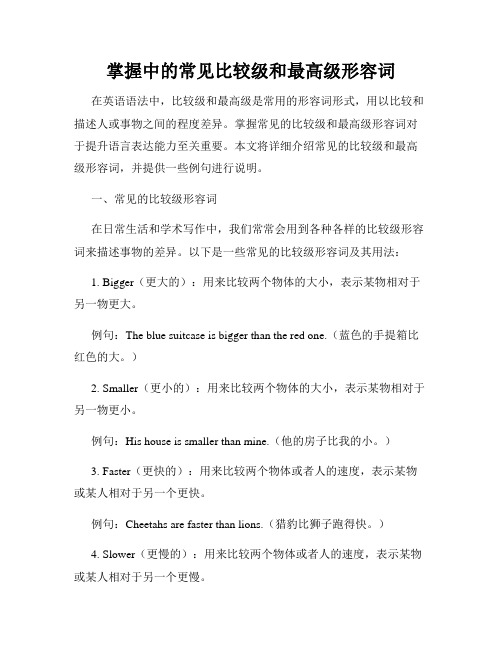
掌握中的常见比较级和最高级形容词在英语语法中,比较级和最高级是常用的形容词形式,用以比较和描述人或事物之间的程度差异。
掌握常见的比较级和最高级形容词对于提升语言表达能力至关重要。
本文将详细介绍常见的比较级和最高级形容词,并提供一些例句进行说明。
一、常见的比较级形容词在日常生活和学术写作中,我们常常会用到各种各样的比较级形容词来描述事物的差异。
以下是一些常见的比较级形容词及其用法:1. Bigger(更大的):用来比较两个物体的大小,表示某物相对于另一物更大。
例句:The blue suitcase is bigger than the red one.(蓝色的手提箱比红色的大。
)2. Smaller(更小的):用来比较两个物体的大小,表示某物相对于另一物更小。
例句:His house is smaller than mine.(他的房子比我的小。
)3. Faster(更快的):用来比较两个物体或者人的速度,表示某物或某人相对于另一个更快。
例句:Cheetahs are faster than lions.(猎豹比狮子跑得快。
)4. Slower(更慢的):用来比较两个物体或者人的速度,表示某物或某人相对于另一个更慢。
例句:The turtle is slower than the rabbit.(乌龟比兔子跑得慢。
)5. Stronger(更强壮的):用来比较两个人或者物体的力量,表示某人或某物相对于另一个更强壮。
例句:He is stronger than his brother.(他比他兄强壮。
)6. Weaker(更弱的):用来比较两个人或者物体的力量,表示某人或某物相对于另一个更弱。
例句:Her immune system is weaker than mine.(她的免疫系统比我的差。
)二、常见的最高级形容词除了比较级形容词,我们也需要了解常见的最高级形容词,用以描述事物之间的最高程度。
形容词的比较级、过去式总结

形容词的比较级:
1、两个事物或人的比较用比较级,比较级后面一般带有单词than。
than后的人称代词用宾格。
结构:形容词+er than...
2.形容词加er的规则:
⑴直接在词尾加er ;如:tall --- taller
⑵以字母e 结尾,加r ;如:nice---nicer
⑶以“辅音字母+y”结尾,变y变i,再加er 。
如:heavy----heavier
⑷重读,辅元辅,双写末尾的辅音字母,再加er ;如:big--- bigger thin---- thinner 3.不规则形容词比较级:good/well-----better
例句:(1).It's taller than both of us together.它比我俩加起来还高。
(2).Your feet are bigger than mine.你的脚比我的大。
(3). I’m heavier than you.我比你重。
过去式规则变化
(1)直接+“ed ”。
如:walk →walked(走)
(2)以字母e 结尾,加“-d”。
如:live →lived (住)like →liked (喜欢)
(3)以“辅音字母+y”结尾,变y变i,再加ed ;
若是词尾为“元音字母+y”,只加“ed ”。
如:study →studied (学习)play→played (游戏)
(4)原形动词词尾为重读闭音节时,先双写该辅音字母再+ “ed”
如:stop →stopped(停止)。
所有比较级单词大全
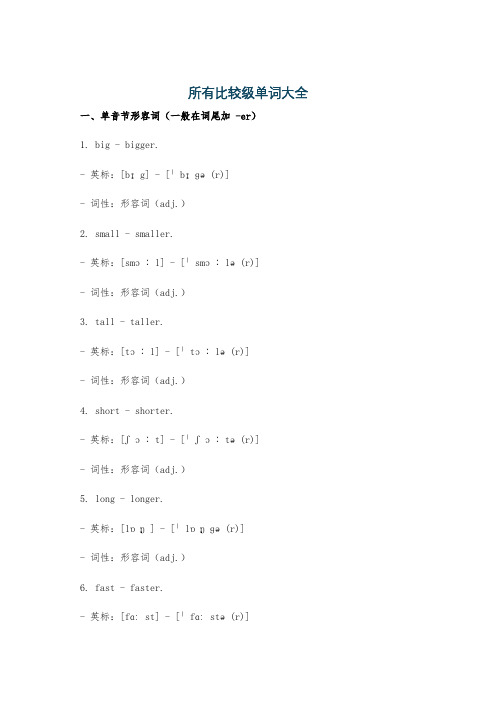
所有比较级单词大全一、单音节形容词(一般在词尾加 -er)1. big - bigger.- 英标:[bɪg] - [ˈbɪɡə(r)]- 词性:形容词(adj.)2. small - smaller.- 英标:[smɔːl] - [ˈsmɔːlə(r)]- 词性:形容词(adj.)3. tall - taller.- 英标:[tɔːl] - [ˈtɔːlə(r)]- 词性:形容词(adj.)4. short - shorter.- 英标:[ʃɔːt] - [ˈʃɔːtə(r)]- 词性:形容词(adj.)5. long - longer.- 英标:[lɒŋ] - [ˈlɒŋɡə(r)]- 词性:形容词(adj.)6. fast - faster.- 英标:[fɑːst] - [ˈfɑːstə(r)]- 词性:形容词(adj.)/副词(adv.)7. slow - slower.- 英标:[sləʊ] - [ˈsləʊə(r)]- 词性:形容词(adj.)/副词(adv.)8. strong - stronger.- 英标:[strɒŋ] - [ˈstrɒŋɡə(r)]- 词性:形容词(adj.)9. weak - weaker.- 英标:[wiːk] - [ˈwiːkə(r)]- 词性:形容词(adj.)10. young - younger.- 英标:[jʌŋ] - [ˈjʌŋɡə(r)]- 词性:形容词(adj.)11. old - older.- 英标:[əʊld] - [ˈəʊldə(r)]- 词性:形容词(adj.)二、以 -e 结尾的单音节形容词,直接加 -r。
1. nice - nicer.- 英标:[naɪs] - [ˈnaɪsə(r)]- 词性:形容词(adj.)2. large - larger.- 英标:[lɑːdʒ] - [ˈlɑːdʒə(r)]- 词性:形容词(adj.)三、重读闭音节,且末尾只有一个辅音字母的形容词,双写这个辅音字母,再加-er。
形容词不规则比较级总结50个
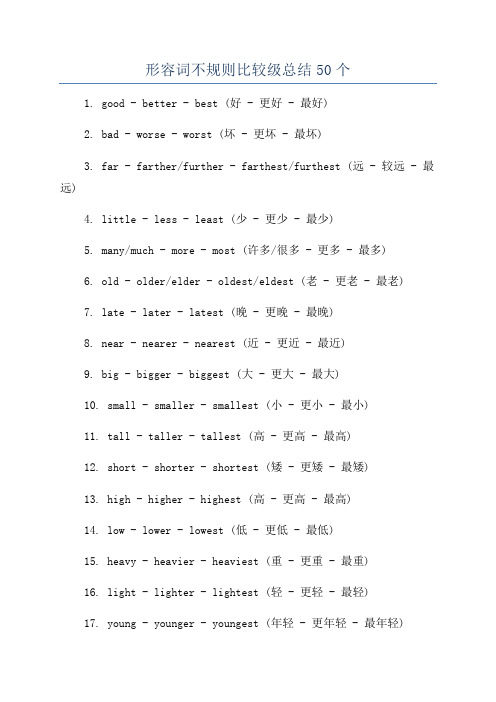
形容词不规则比较级总结50个1. good - better - best (好 - 更好 - 最好)2. bad - worse - worst (坏 - 更坏 - 最坏)3. far - farther/further - farthest/furthest (远 - 较远 - 最远)4. little - less - least (少 - 更少 - 最少)5. many/much - more - most (许多/很多 - 更多 - 最多)6. old - older/elder - oldest/eldest (老 - 更老 - 最老)7. late - later - latest (晚 - 更晚 - 最晚)8. near - nearer - nearest (近 - 更近 - 最近)9. big - bigger - biggest (大 - 更大 - 最大)10. small - smaller - smallest (小 - 更小 - 最小)11. tall - taller - tallest (高 - 更高 - 最高)12. short - shorter - shortest (矮 - 更矮 - 最矮)13. high - higher - highest (高 - 更高 - 最高)14. low - lower - lowest (低 - 更低 - 最低)15. heavy - heavier - heaviest (重 - 更重 - 最重)16. light - lighter - lightest (轻 - 更轻 - 最轻)17. young - younger - youngest (年轻 - 更年轻 - 最年轻)18. old - older/elder - oldest/eldest (旧 - 更旧 - 最旧)19. long - longer - longest (长 - 更长 - 最长)20. short - shorter - shortest (短 - 更短 - 最短)21. deep - deeper - deepest (深 - 更深 - 最深)22. shallow - shallower - shallowest (浅 - 更浅 - 最浅)23. narrow - narrower - narrowest (窄 - 更窄 - 最窄)24. wide - wider - widest (宽 - 更宽 - 最宽)25. fat - fatter - fattest (胖 - 更胖 - 最胖)26. thin - thinner - thinnest (瘦 - 更瘦 - 最瘦)27. strong - stronger - strongest (强壮 - 更强壮 - 最强壮)28. weak - weaker - weakest (弱 - 更弱 - 最弱)29. slow - slower - slowest (慢 - 更慢 - 最慢)30. fast - faster - fastest (快 - 更快 - 最快)31. hot - hotter - hottest (热 - 更热 - 最热)32. cold - colder - coldest (冷 - 更冷 - 最冷)33. clean - cleaner - cleanest (干净 - 更干净 - 最干净)34. dirty - dirtier - dirtiest (脏 - 更脏 - 最脏)35. sleepy - sleepier - sleepiest (困 - 更困 - 最困)36. awake - awaker - awakest (醒 - 更醒 - 最醒)37. hungry - hungrier - hungriest (饥饿 - 更饥饿 - 最饥饿)38. full - fuller - fullest (满 - 更满 - 最满)39. strong - stronger - strongest (强力 - 更强力 - 最强力)40. weak - weaker - weakest (弱 - 更弱 - 最弱)41. soft - softer - softest (软 - 更软 - 最软)42. hard - harder - hardest (硬 - 更硬 - 最硬)43. high - higher - highest (高 - 更高 - 最高)44. low - lower - lowest (低 - 更低 - 最低)45. happy - happier - happiest (快乐 - 更快乐 - 最快乐)46. sad - sadder - saddest (伤心 - 更伤心 - 最伤心)47. loud - louder - loudest (大声 - 更大声 - 最大声)48. quiet - quieter - quietest (安静 - 更安静 - 最安静)49. bright - brighter - brightest (明亮 - 更明亮 - 最明亮)。
常用形容词 原型比较级最高级
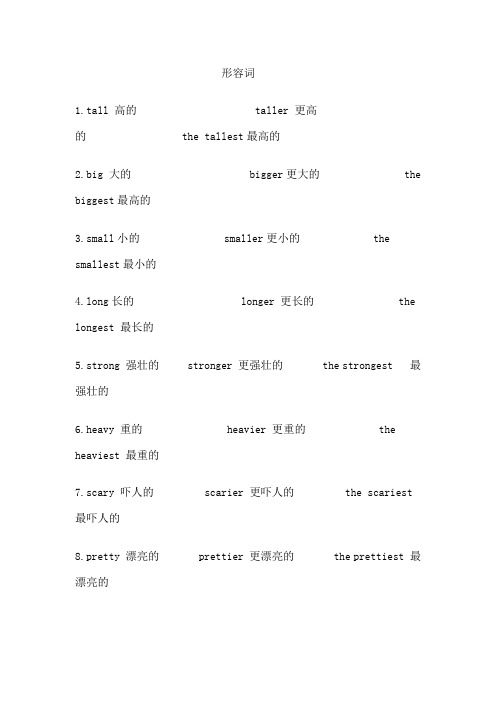
形容词1.tall 高的 taller 更高的 the tallest最高的2.big 大的 bigger更大的 the biggest最高的3.small小的 smaller更小的 the smallest最小的4.long长的 longer 更长的 the longest 最长的5.strong 强壮的 stronger 更强壮的 the strongest 最强壮的6.heavy 重的 heavier 更重的 the heaviest 最重的7.scary 吓人的 scarier 更吓人的 the scariest 最吓人的8.pretty 漂亮的 prettier 更漂亮的 the prettiest 最漂亮的9.noisy 吵闹的 noisier 更吵闹的 the noisiest 最吵闹的10.hairy 多毛的 hairier 更多毛的 the hairiest 最多毛的11.tiny 微小的 tinier 更微小的 the tiniest 最微小的四五单元过去式1. wear---wore 穿2. ride ----rode 骑3. pay ----paid 支付4. fall -----fell 落下5. wake---woke 醒来6.write----wrote 写7. give----gave 给8. eat----ate 吃9.make--made 制作10. meet---met 遇见11. come---came 来12. speak---spoke 说13. catch----caught 抓14. swim---swam 游泳15. break---broke 弄坏16. have---had 有17.drink--drank 喝18.feel--felt 感19.walk----walked 步行20.miss---missed 想念21.start----started 开始22.explain---explained 解释23.talk----talked 交谈24.shout----shouted 喊25.save---saved 救26.live----lived 住27.celebrate----celebrated 庆祝28.travel---travelled 旅行29.stop----stopped 停止Jingle Bell RockJingle bell, jingle bell, jingle bell rockJingle bells swing and jingle bells ringsnowing and blowing up bushels of funnow the jingle hop has begunJingle bell, jingle bell, jingle bell rockJingle bells chime in jingle bell timedancing and prancing in jingle bell square in the frosty airwhat a bright time, it's the right timeto rock the night awayJingle bell time is a swell timeto go gliding in a one-horse sleighgiddy-up jingle horse, pick up your feetJingle bell around the clockmix and a-mingle in the jingling feetthat's the jingle bell rockwhat a bright time, it's the right timeto rock the night awayJingle bell time is a swell timeto go gliding in a one-horse sleighgiddy-up jingle horse, pick up your feetJingle bell around the clockmix and a-mingle in the jingling beatthat's the jingle bell,that's the jingle bell,that's the jingle bell rock.。
(完整版)英语单词比较级
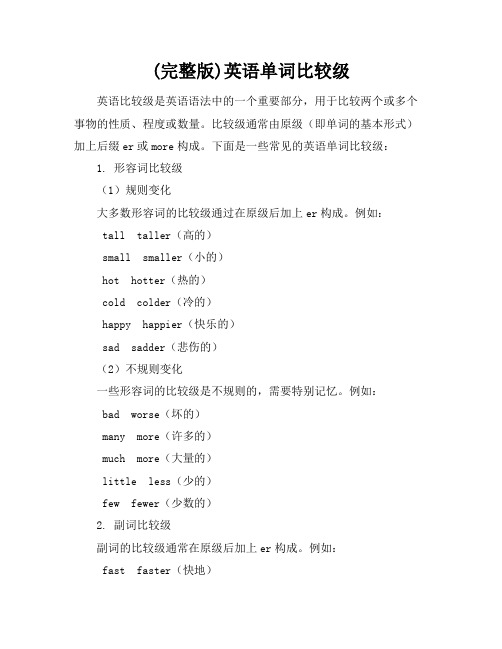
(完整版)英语单词比较级英语比较级是英语语法中的一个重要部分,用于比较两个或多个事物的性质、程度或数量。
比较级通常由原级(即单词的基本形式)加上后缀er或more构成。
下面是一些常见的英语单词比较级:1. 形容词比较级(1)规则变化大多数形容词的比较级通过在原级后加上er构成。
例如:tall taller(高的)small smaller(小的)hot hotter(热的)cold colder(冷的)happy happier(快乐的)sad sadder(悲伤的)(2)不规则变化一些形容词的比较级是不规则的,需要特别记忆。
例如:bad worse(坏的)many more(许多的)much more(大量的)little less(少的)few fewer(少数的)2. 副词比较级副词的比较级通常在原级后加上er构成。
例如:fast faster(快地)slowly more slowly(慢地)carefully more carefully(仔细地)well better(好地)badly worse(坏地)3. 比较级的用法(1)形容词和副词的比较级通常与than连用,构成比较句。
例如:He is taller than me.(他比我高。
)She runs faster than him.(她比他跑得快。
)(2)在比较级前可以使用一些修饰词,如a little, much, far 等,表示比较的程度。
例如:This book is a little more interesting than that one.(这本书比那本更有趣。
)She sings much better than her sister.(她唱歌比她姐姐唱得好多了。
)She is the tallest girl in our class.(她是我们班最高的女孩。
)He runs the fastest in our school.(他是我们学校跑得最快的。
(完整)英语常见形容词及比较级、最高级变化一览表

形容词第一章比较级、最高级变化一览表规则变化1.单音节以及少数双音节的词尾加上“er”“est”构成比较级、最高级:bright(明亮的)—brighter—brightest broad(广阔的)—broader—broadestcheap(便宜的)—cheaper—cheapest clean(干净的)—cleaner—cleanest clever(聪明的)—cleverer—cleverest cold(寒冷的)—colder—coldestcool(凉的)—cooler—coolest dark(黑暗的)—darker—darkestdear(贵的)—dearer—dearest deep(深的)—deeper—deepestfast(迅速的)—faster—fastest few(少的)—fewer—fewestgreat(伟大的)—greater—greatest hard(困难的,硬的)—harder—hardesthigh(高的)—higher—highest kind(善良的)—kinder—kindestlight(轻的)—lighter—lightest long(长的)—longer—longestloud(响亮的)—louder—loudest low(低的)—lower—lowestnear(近的)—nearer—nearest new(新的)—newer—newestpoor(穷的)—poorer—poorest quick(快的)—quicker—quickestquiet(安静的)—quieter—quietest rich(富裕的)—richer—richestshort(短的)—shorter—shortest slow(慢的)—slower—slowestsmall(小的)—smaller—smallest smart(聪明的)—smarter—smartestsoft(柔软的)—softer—softest strong(强壮的)—stronger—strongestsweet(甜的)—sweeter—sweetest tall(高的)-taller - tallest thick(厚的)—thicker—thickest warm(温暖的)—warmer—warmestweak(弱的)—weaker—weakest young(年轻的)—younger—youngest2以一个元音加一个辅音字母结尾的单音节词(即重读闭音节词),双写结尾的辅音字母er,-estbig(大的)—bigger—biggest fat(胖的)—fatter—fattesthot(热的)—hotter—hottest red(红的)—redder—reddestsad(伤心的)—sadder—saddest thin(瘦的)—thinner—thinnestwet(湿的)—wetter—wettest mad(疯的)—madder—maddest特别提醒:new, few, slow, clean等词含有字母组合,且发的是长元音,不用双写。
形容词的比较级与最高级的例词

形容词的比较级与最高级的例词形容词是用来描述人、事物、情感和行为特征的词语,而形容词的比较级和最高级则是用来对不同事物或人的特征进行比较和排序。
在英语中,形容词的比较级和最高级有一定的构造规则和用法。
下面将以几个常见的形容词为例,详细介绍形容词的比较级和最高级。
1. Tall(高):- 比较级:taller(更高的)- 最高级:tallest(最高的)举例:- My brother is taller than me.(我的哥哥比我高)- John is the tallest student in our class.(约翰是我们班最高的学生)2. Bright(明亮的):- 比较级:brighter(更明亮的)- 最高级:brightest(最明亮的)举例:- The sun is brighter than the moon.(太阳比月亮更明亮)- This room has the brightest light.(这个房间有最亮的光线)3. Fast(快的):- 比较级:faster(更快的)- 最高级:fastest(最快的)举例:- The cheetah is faster than any other animal.(猎豹是比其他动物都更快的)- Usain Bolt is the fastest sprinter in the world.(尤塞恩·博尔特是世界上最快的短跑运动员)4. Delicious(美味的):- 比较级:more delicious(更美味的)- 最高级:most delicious(最美味的)举例:- The cake is more delicious than the cookies.(蛋糕比饼干更美味)- This restaurant serves the most delicious food in town.(这家餐厅提供镇上最美味的食物)5. Interesting(有趣的):- 比较级:more interesting(更有趣的)- 最高级:most interesting(最有趣的)举例:- The book is more interesting than the movie.(这本书比电影更有趣)- The history museum was the most interesting place we visited.(历史博物馆是我们参观的最有趣的地方)通过上述例子,我们可以看到形容词的比较级和最高级的构造方式。
形容词比较级知识点整理总结
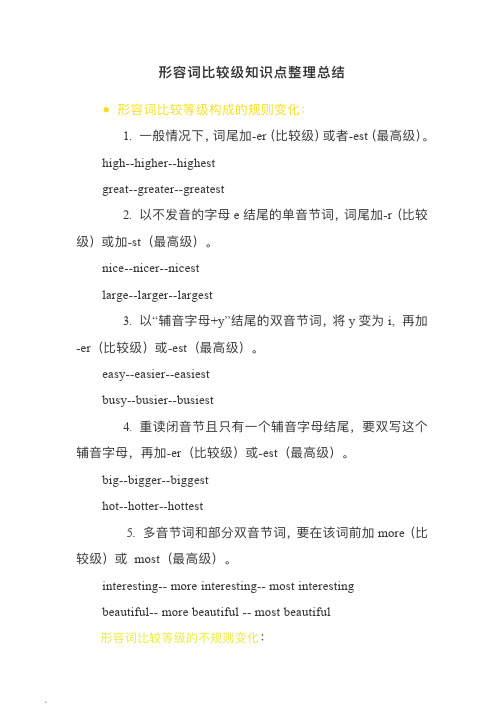
?” 哪一个最......?
Which is the tallest of the three boys? 这三个男孩中哪个最高? 提示:形容词比较级前可以用 much, a lot, a little, still, far, hardly, no, even, twice, five times 等修饰。 注意:在比较句型中,被比较的双方必须是同一类人或事 物。
。
猴子对自己的行为感到很后悔,但为时已晚。“我应该学会撒网后再碰网 的。过于相信自己的能力,才落得如此下场。” 最后猴子被淹死了。
。
My dog is as old as that one. 我的狗和那只狗times+as+形容词原级+as” 是......的几倍。
This garden is ten times as large as that one. 这个花园是那个的十倍。
3. “A+动词+形容词比较级+than+B” A 比 B 更
Our hometown is more and more beautiful. 我们的家乡越来越美丽了。
6. “the+比较级 , the+比较级......” 越.....越.....
The sooner, the better. 越快越好。
7. “the+形容词比较级+of the two” 两个中较 的
形容词比较级知识点整理总结
● 形容词比较等级构成的规则变化: 1. 一般情况下,词尾加-er(比较级)或者-es(t 最高级)。
high--higher--highest great--greater--greatest
2. 以不发音的字⺟ e 结尾的单音节词,词尾加-r(比较 级)或加-st(最高级)。
形容词比较级大全总结
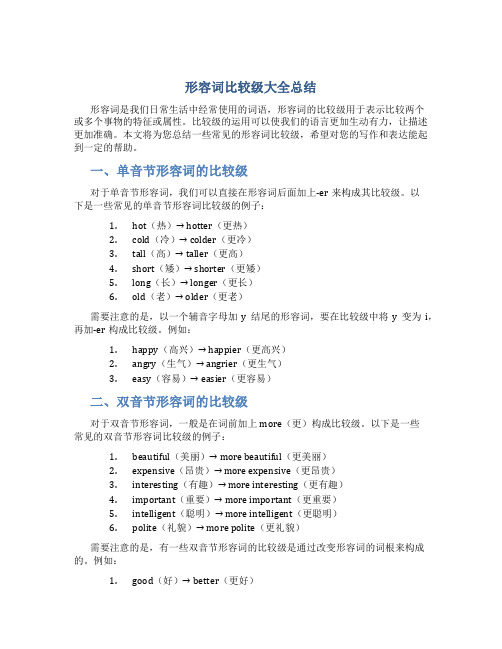
形容词比较级大全总结形容词是我们日常生活中经常使用的词语,形容词的比较级用于表示比较两个或多个事物的特征或属性。
比较级的运用可以使我们的语言更加生动有力,让描述更加准确。
本文将为您总结一些常见的形容词比较级,希望对您的写作和表达能起到一定的帮助。
一、单音节形容词的比较级对于单音节形容词,我们可以直接在形容词后面加上-er来构成其比较级。
以下是一些常见的单音节形容词比较级的例子:1.hot(热)→ hotter(更热)2.cold(冷)→ colder(更冷)3.tall(高)→ taller(更高)4.short(矮)→ shorter(更矮)5.long(长)→ longer(更长)6.old(老)→ older(更老)需要注意的是,以一个辅音字母加y结尾的形容词,要在比较级中将y变为i,再加-er构成比较级。
例如:1.happy(高兴)→ happier(更高兴)2.angry(生气)→ angrier(更生气)3.easy(容易)→ easier(更容易)二、双音节形容词的比较级对于双音节形容词,一般是在词前加上more(更)构成比较级。
以下是一些常见的双音节形容词比较级的例子:1.beautiful(美丽)→ more beautiful(更美丽)2.expensive(昂贵)→ more expensive(更昂贵)3.interesting(有趣)→ more interesting(更有趣)4.important(重要)→ more important(更重要)5.intelligent(聪明)→ more intelligent(更聪明)6.polite(礼貌)→ more polite(更礼貌)需要注意的是,有一些双音节形容词的比较级是通过改变形容词的词根来构成的。
例如:1.good(好)→ better(更好)2.bad(坏)→ worse(更坏)3.little(小)→ less(更小)三、三音节及以上形容词的比较级对于三音节及以上的形容词,一般也是在词前加上more(更)构成比较级,或者通过改变形容词的词根来构成比较级。
常用形容词及比较级

学英语形容词比较级顺口溜比较级是形容词,一好一坏要记牢,good更好是better,bad更坏是worse结尾有e只加r,nice加r变nicer;双写目前有5个,bigger,fatter,hotter,sadder和thinner其余全部加er。
小学英语常见形容词及比较级变化一览表1.在形容词词尾加上“er”“构成比较级:cheap(便宜的)—cheaper clean(干净的)—cleanerclever(聪明的)—cleverer cold(寒冷的)—coldercool(凉的)—cooler dark(黑暗的)—darkerfast(迅速的)—faster great(伟大的)—greaterhard(困难的,硬的)—harder low(低的)—lowerhigh(高的)—higher kind(善良的)—kinderlight(轻的)—lighter long(长的)—longernear(近的)—nearer new(新的)—newerquiet(安静的)—quieter rich(富裕的)—richershort(短的)—shorter slow(慢的)—slowersmall(小的)—smaller smart(聪明的)—smarterstrong(强壮的)—stronger sweet(甜的)—sweetertall(高的)-taller young(年轻的)—younger2.双写最后一个字母,再加上“er”构成比较级:big(大的)—bigger fat(胖的)—fatterhot(热的)—hotter sad(伤心的)—sadderthin(瘦的)—thinner3.以不发音的字母e结尾的形容词,加上“r”构成比较级:close(接近的)—closer fine(好的,完美的)—finer large(巨大的)—larger late(迟的)—laternice(好的)—nicer white(白的)—whiter4.以字母y结尾的形容词,把y改为i,再加上“er”构成比较级:busy(忙碌的)—busier dirty(脏的)—dirtierearly(早的)—earlier easy(容易的)—easierfriendly(友好的)—friendlier pretty(美丽的)—prettier funny(好玩的)—funnier happy(开心的)—happier healthy(健康的)—healthier heavy(重的)—heavierhungry(饿的)—hungrier lazy(懒惰的)—lazierlucky(幸运的)—luckier noisy(嘈杂的)—noisier 5.双音节、多音节形容词,在单词前面加上“more”构成比较级:afraid(害怕的)—more afraidbeautiful(美丽的)—more beautifulcareful(仔细的)—more carefuldelicious(美味的)—more deliciousexciting(令人兴奋的)—more excitingexpensive(昂贵的)—more expensivefamous(著名的)—more famoushard-working(勤奋的)—more hard-workinghelpful(有帮助的)—more helpfulinteresting(有趣的)—more interestingpolite(有礼貌的)—more politetired(累的)—more tired6.不规则变化的形容词:bad(坏的)—worse far(远的)—farthergood(好的)—better ill(病的)—worselittle(少的)—less many(多的)—moremuch(多的)—more well(好的,身体好的)—better old(年老的)—older(elder)。
(完整版)形容词比较级常用词总结

形容词比较级常用词总结1.在形容词词尾加上“er” “est” 构成比较级、最高级:bright(明亮的)—brighter—brightest broad(广阔的)—broader—broadest cheap(便宜的)—cheaper—cheapest clean(干净的)—cleaner—cleanest clever(聪明的)—cleverer—cleverest cold(寒冷的)—colder—coldestcool(凉的)—cooler—coolest dark(黑暗的)—darker—darkestdear(贵的)—dearer—dearest deep(深的)—deeper—deepestfast(迅速的)—faster—fastest few(少的)—fewer—fewestgreat(伟大的)—greater—greatest hard(困难的,硬的)—harder—hardest high(高的)—higher—highest kind(善良的)—kinder—kindestlight(轻的)—lighter—lightest long(长的)—longer—longestloud(响亮的)—louder—loudest low(低的)—lower—lowestnear(近的)—nearer—nearest new(新的)—newer—newestpoor(穷的)—poorer—poorest quick(快的)—quicker—quickestquiet(安静的)—quieter—quietest rich(富裕的)—richer—richestshort(短的)—shorter—shortest slow(慢的)—slower—slowestsmall(小的)—smaller—smallest smart(聪明的)—smarter—smartestsoft(柔软的)—softer—softest strong(强壮的)—stronger—strongest sweet(甜的)—sweeter—sweetest tall(高的)-taller-tallestthick(厚的)—thicker—thickest warm(温暖的)—warmer—warmestweak(弱的)—weaker—weakest young(年轻的)—younger—youngest 2.双写最后一个字母,再加上“er” “est” 构成比较级、最高级:big(大的)—bigger—biggest fat(胖的)—fatter—fattesthot(热的)—hotter—hottest red(红的)—redder—reddestsad(伤心的)—sadder—saddest thin(瘦的)—thinner—thinnestwet(湿的)—wetter—wettest mad(疯的)—madder—maddest3.以不发音的字母e结尾的形容词,加上“r” “st” 构成比较级、最高级:able(能干的)—abler—ablest brave(勇敢的)—braver—bravestclose(接近的)—closer—closest fine(好的,完美的)—finer—finestlarge(巨大的)—larger—largest late(迟的)—later—latestnice(好的)—nicer—nicest ripe(成熟的)—riper—ripestrude(粗鲁的)—ruder—rudest safe(安全的)—safer—safeststrange(奇怪的)—stranger—strangest wide(宽广的)—wider—widestwise(睿智的,聪明的)—wiser—wisest white(白的)—whiter—whitest4.以字母y结尾的形容词,把y改为i,再加上“er” “est” 构成比较级、最高级:busy(忙碌的)—busier—busiest dirty(脏的)—dirtier—dirtiestdry(干燥的)—drier—driest early(早的)—earlier—earliesteasy(容易的)—easier—easiest friendly(友好的)—friendlier—friendliestfunny(好玩的)—funnier—funniest happy(开心的)—happier—happiesthealthy(健康的)—healthier—healthiest heavy(重的)—heavier—heaviest hungry(饿的)—hungrier—hungriest lazy(懒惰的)—lazier—laziestlucky(幸运的)—luckier—luckiest naughty(调皮的)—naughtier—naughtiest noisy(嘈杂的)—noisier—noisiest pretty(美丽的)—prettier—prettiestsilly(傻的)—sillier—silliest spicy(辣的)—spicier—spiciestthirsty(渴的)—thirstier—thirstiest ugly(丑的)—uglier—ugliest5.双音节、多音节形容词,在单词前面加上“more” “most” 构成比较级、最高级:afraid(害怕的)—more afraid—most afraidbeautiful(美丽的)—more beautiful—most beautifulcareful(仔细的)—more careful—most carefulcheerful(开心的)—more cheerful—most cheerfulcrowded(拥挤的)—more crowded—most crowdeddangerous(危险的)—more dangerous—most dangerousdelicious(美味的)—more delicious—most deliciousdifficult(困难的)—more difficult—most difficultexciting(令人兴奋的)—more exciting—most excitingexpensive(昂贵的)—more expensive—most expensivefamous(著名的)—more famous—most famousfrightened(受惊的)—more frightened—most frightenedfrightening(令人害怕的)—more frightening—most frighteninghard-working(勤奋的)—more hard-working—most hard-workinghelpful(有帮助的)—more helpful—most helpfulhonest(诚实的)—more honest—most honestimportant(重要的)—more important—most importantinteresting(有趣的)—more interesting—most interestingpolite(有礼貌的)—more polite—most politeterrible(可怕的)—more terrible—most terribletired(累的)—more tired—most tired6.不规则变化的形容词:bad(坏的)—worse—worst far(远的)—farther—farthest (far—further—furthest)good(好的)—better—best ill(病的)—worse—worstlittle(少的)—less—least many(多的)—more—most much(多的)—more—mostold(年老的)—older—oldest ( old—elder—eldest) well(好的,身体好的)—better—best。
形容词的比较级

形容词的比较级
1. 形容词比较级:taller更高的,shorter更矮的,stronger更强壮的,thinner 更瘦得,older年龄更大的,younger更年轻的,bigger更大的,smaller更小的,longer更长的,heavier更重的。
2. 形容词比较级的构成:
(1). 一般直接加er, 如:tall—taller, short—shorter, small—smaller.
(2). 单音节词如果以e结尾,只加r, 如:strange—stranger.
(3). 闭音节单音节词如末尾只有一个辅音字母,须先双写这个辅音字母,再
加r,如:big—bigger, thin—thinner, hot—hotter
(4). 以辅音字母+y结尾的词,变y为i加er, 如:heavy—heavier, funny-funnier.
(5). 双音节和多音节词在前面加more, 如:more beautiful.
(6). 特殊形式,如:good—better, many—more.
3. A +is(are)+形容词比较级+than +B.
本句是形容词比较级的典型用法,表示A比B更….。
常用在两者在某一方面作比较时,如:You are 10 cm taller than me.你比我高10厘米。
The monkey is thinner that one. 这只猴子比那只瘦。
强化训练
翻译:
1. 你的狗比我的大。
2. 我比你大四岁。
Keys: 1. My dog is bigger than yours. 2. I’m four years older than you.。
- 1、下载文档前请自行甄别文档内容的完整性,平台不提供额外的编辑、内容补充、找答案等附加服务。
- 2、"仅部分预览"的文档,不可在线预览部分如存在完整性等问题,可反馈申请退款(可完整预览的文档不适用该条件!)。
- 3、如文档侵犯您的权益,请联系客服反馈,我们会尽快为您处理(人工客服工作时间:9:00-18:30)。
形容词原形一比较圾一最高级
(-)规则变化
1 . big -bigger -the biggest 大的-更大的-最大的
2 . small - smaller - the smallest小的-更小的-最小的
3 . tall - taller - the tallest高的-更高的-最高的
4 . long -longer - the longest长的-更长的-最长的
5 . short-shorter-the shortest短(矮)的-更短(矮)的-最短(矮)的
6 . old - older - the oldest老(旧)的一更老(旧)的-最老(旧)的
7 . young-younger - the youngest年轻的-更年轻的一最年轻的
8. weak - weaker - the weakest虚弱的一更虚弱的-最虚弱的
9. strong- stronger- the strongest强壮的-更强壮的一最强壮的1 0 . quick - quicker-quickest快的-更快的一最快的
ll , fast -faster - the fastest快的-更快的一最快的
1 2 . slow - slower -slowest慢的一更慢的-最慢的
1 3 . fat - fatter -the fattest胖的一更胖的-最胖的
1 4 . thin - thinner - the thinnest瘦的-更瘦的-最瘦的
1 5 . hot - hotter - the hottest热的-更热的-最热的
1 6 . cold - colder - the coldest冷的-更冷的-最冷的
1 7. cool - cooler - the coolest凉爽的-更凉爽的-最凉爽的18. warm - warmer - the warmest温暖的-更温暖的-最温暖的
1 9. clean -leaner - the cleanest干净的一更干净的-最干净的
2 0 . dirty - dirtier - the dirtiest脏的-更脏的-最脏的
2 1 . happy - happier - the happiest高兴的一更高兴的-最高兴的2 2 . sad - sadder . the saddest伤心的一更位心的-最伤心的
2 3 . fine - finer - the finest好的-更好的-最好的
2 4 . ugly - uglier the ugliest丑的-更丑的-最丑的
2 5 . high - higher - the highest高的一更高的-最高的
2 6 . large - larger - the largest大的一更大的-最大的2 7 . loud - louder - the loudest大声的-更大声的-最大声的
2 8 . quiet - quieter - the quietest安静的-更安静的-最安静的2 9. easy - easier - the easiest简单的一更简单的-最简单的多音节形容词比较级,最高级
1.beautiful - more beautiful美丽的-更美丽的
-the most beautiful最美丽的
2. difficult- more difficult 难的一更难的
-the most difficult 最难的
3.delicious - more delicious 美味的一更美味的
-the most delicious 最美味的
4. interesting - more interesting有趣的一更有趣的
-The most interesting 最有趣的
5.boring - more boring无聊的一更无聊的
-the most boring最无聊的
6.friendly - more friendly 友好的一更友好的
-the most friendly最友好的
7.important -more important 重要的一更重要的
-the most important 最重要的
8.popular - more popular流行的一更流行的
-the most popular 最流行的
9.exciting - more exciting兴奋的一更兴奋的
-the most exciting 最兴奋的
10.expensive - more expensive贵的一更贵的
-the most expensive最贵的
11.different -more different不同的一更不同的
-the most different最不同的
12.quickly - more quickly 快地一更快地
-the most quickly 最快地
13.slowly - more slowly慢地一更慢地
-the most slowly最馒地
14.famous - more famous 著名的一更著名的
-he most famous 最著名的
15. careful -more careful 认真的一更认真的
-the most careful 最认真的。
